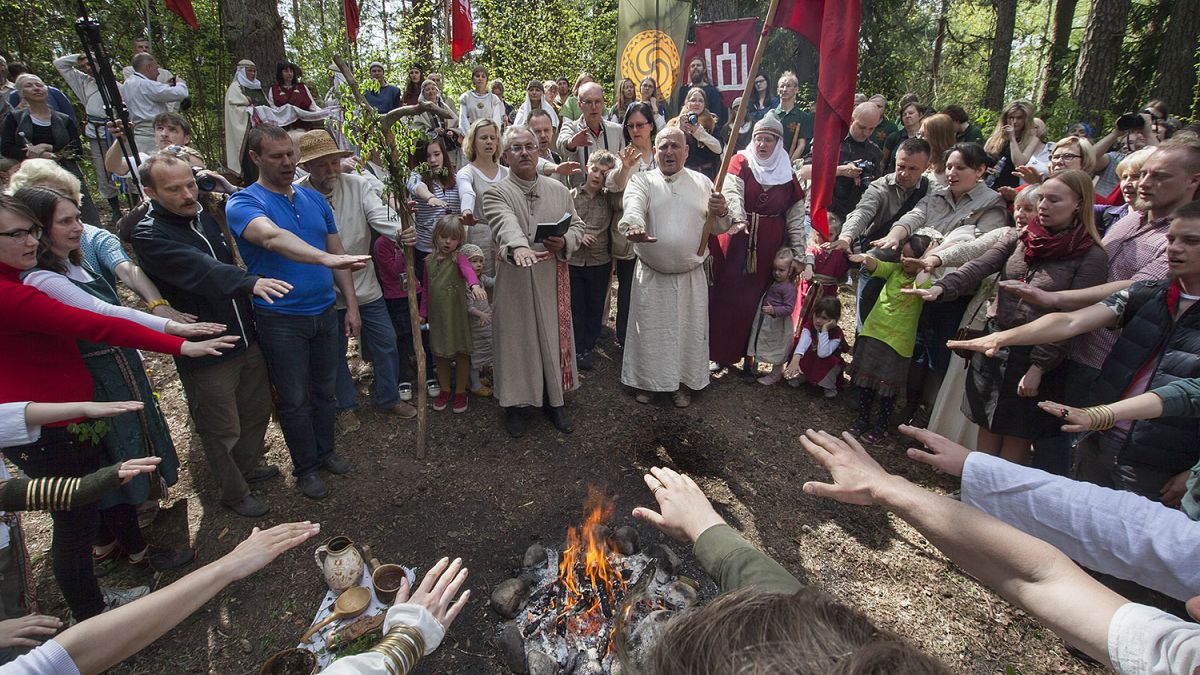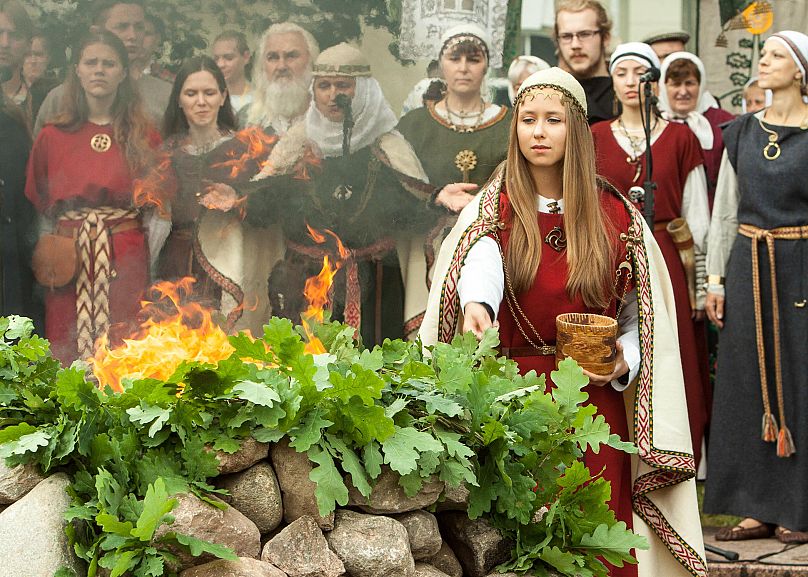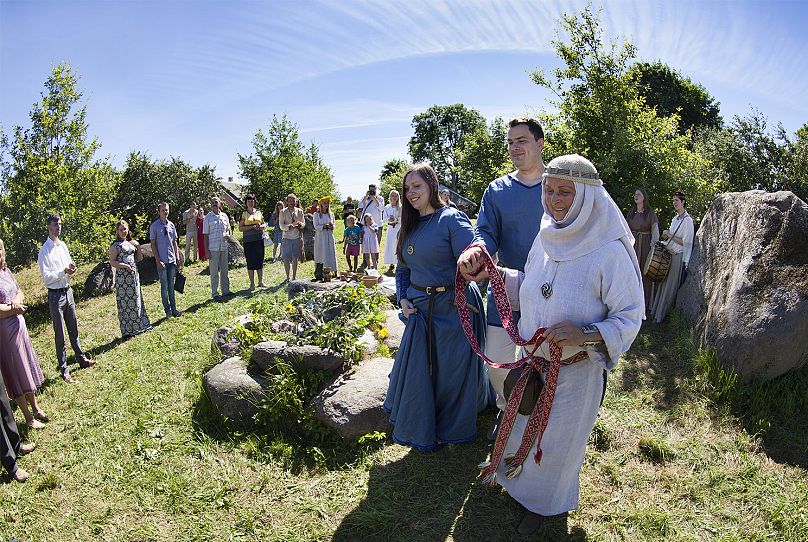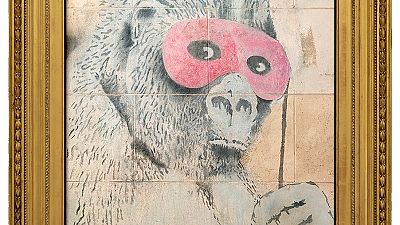Followers of Romuva have been attacked by the Catholic church, Teutonic Knights and the Soviets, but they've just been given a massive break.
In 1973, Jonas Trinkūnas, a lecturer who studied folklore and travelled Lithuania collecting folk songs and cultural practices, was fired from Vilnius University for dissident activity.
Six years prior to this, the scholar and his companions organised a ‘Rasa’ ceremony in the ancient capital of the Grand Duchy of Lithuania, Kernavė. The group lit ceremonial fires on a stone altar, sang folk songs and made offerings to the gods and goddesses, drawing the ire of the KGB.
“In the Soviet times you couldn't declare that you prayed to gods,” says Inija Trinkūnienė, Trinkūnas’ wife, from her apartment in Vilnius.
“We couldn’t declare it officially but we, as friends, set up our spaces and we celebrated festivals and so on.”
Inija Trinkūnienė is the Krivė, or high priestess, of the Romuva faith; a neo-pagan group established in part by her husband.
In 2011 there were roughly 5,000 followers of Romuva in Lithuania, with 25 groups in different locations around the Baltic nation.
Our interview with Inija Trinkūnienė took place the morning of 7 December, the day a debate on state recognition for Romuva was due to take place in the Lithuanian parliament, Seimas.
“Today is a very special day,” Trinkūnienė says.
The high priestess and the rest of the Romuva followers would go on to win that vote by 41-18, progressing their right to state recognition to a committee and discussion stage by Seimas.
The Romuva struggle through history
Lithuania was the last pagan nation in Europe, with most remaining baltic pagans converting to Christianity after the creation of the Commonwealth of Poland-Lithuania in 1569. Prior to this many Prussian pagans had been killed or forced to convert by the savage Teutonic Knights.
Then, during the 19th century, many Lithuanians began to look to their cultural past to build a sense of national identity.
“The attempts to restore the ancient faith started at the end of the 19th century and the start of the 20th century. Some famous people, famous artists and so on declared it,” says Trinkūnienė.
The revival was squashed by the Soviet occupation of 1940 when many practitioners were targeted due to the nationalist nature of Romuva and either deported to gulags or killed.
Jonas Trinkūnas’ Rasa celebration took place 27 years after this initial crackdown. He based the rituals that the neo-pagan Romuva practice on the folktales and myths that he collected whilst travelling rural Lithuania.
These traditions which had been passed down in communities since the adoption of Christianity, and in some cases woven into observations of catholicism.
Trinkūnas’ work was an important act of defiance against the dominance of the USSR.
“It was both a culture because you felt you were close to your country and to your ancestors, and a resistance because it wasn’t allowed to be done publicly,” Trinkūnienė says.
Amongst the material gathered by the researcher on his travels were nearly one million folk songs. Many of these have been recorded by the ceremonial choir, the Kulgrinda, that Inija Trinkūnienė is a part of.
“When you look at the contents of these songs you can see all of the mythology,” says Trinkūnienė.
“We have songs for all the calendar periods.”
Since the rebellious Rasa celebrated by Trinkūnienė's late-husband, the Romuva now mark festivals throughout the year, and have ceremonies for special events like weddings and baptisms. The revival is rooted in the oral traditions from Lithuania's rural heartlands.
In 1992, two years after Lithuanian independence, the Romuva registered as a religion with the government. Once a religion is registered for 25-years, provided it has good standing in society, it can be state recognised.
However, the Seimas voted not to recognise Romuva in 2019 after a debate in which the faith's followers were accused of being agents of the Kremlin. The Catholic church was implicated in this campaign of disinformation, which Inija Trinkūnienė described as a “humiliation” in the Lithuanian press.
The return of the issue to parliament this week takes place after a high-profile case at the European Human Rights (ECHR). In Romuva vs Lithuania, the court ruled in favour of the pagans, and said that Seimas had violated Article 9 of the Convention for the Protection of Human Rights and Fundamental Freedoms; Freedom of Thought, Conscience and Religion.
What next for Romuva?
Soon Trinkūnienė and her group will celebrate the winter solstice or “the returning of the sun’.
“It was in ancient time such a very special period,” she says. The Romuva belief is that the sun was made by blacksmiths and is carried on the antlers of deer; the solstice signals the sun returning as the days lengthen.
The religious group is also deeply invested in pre-Christian goddesses. This is part of a feminine culture which at one time, according to Lithuanian archaeologist Marija Gimbutas, proliferated throughout Europe and the Mediterranean.
“It was the civilisation of a woman before the male culture came,” says Trinkūnienė
“Matriarchal cultures were spread all over the world, we are the only remaining one nowadays.”
But Romuva is also spreading abroad with followers in the UK, USA and Australia thanks to the Lithuanian diaspora. Just days before our call, Trinkūnienė had taken part in a ceremony with her daughter in Ireland.
“When I am doing the rituals, I feel like I’m in the centre of the world and singing songs. I feel harmony with the people around me, with nature, with gods and goddesses,” says the Krivė.
Her commitment to the faith is inspiring, and so is the tenacity of Romuva followers. After centuries of persecution, this ancient religion may soon have the dignity of state recognition, which they so desperately crave.






